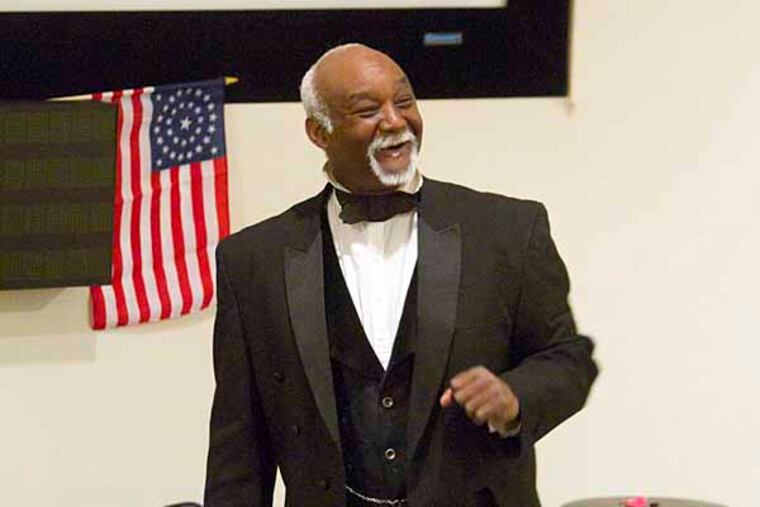
Joe Becton put on his half top hat and straightened his bow tie, tugged at the lapels of his morning jacket, and strode through the lobby of the Independence Visitor Center.
"Steal away, steal away, steal away to Jesus!"
His voice filled the room. Park rangers grinned. Tourists stared.
"Steal away, steal away home, I ain't got long to stay here," he sang, walking into the center's theater followed by a small crowd. For the next hour, he led the group through a whirlwind history of the Underground Railroad, punctuated every few minutes by a traditional song or spiritual.
By the end of the hour, the entire theater was singing along.
Becton is 60, a Philadelphia native and former National Park Service ranger who now performs historical reenactments full time. His specialty is black history, especially the black history of Philadelphia, and he's booked solid through February, otherwise known as Black History Month.
The son of a history teacher at Mayer Sulzberger Middle School, Becton took to the subject at an early age and eventually graduated with a degree in it from the University of West Florida. After graduation, he took a job with the National Park Service at Golf Islands National Seashore in Pensacola, Fla.
It was there that Becton first took part in a historical reenactment, playing a Union soldier at one of the park's various forts during a Fourth of July celebration.
"People gave me strange looks as they walked in, and I couldn't figure out why," he said. "Then I realized: I'm a black guy, in Pensacola, Fla., on July 4, in a Union uniform. That was the last thing they wanted to see."
Becton wasn't deterred. He stayed with the Park Service, working at Fairmount Park and Independence Mall until four years ago, when he was diagnosed with diabetes and decided to retire. With nine period costumes, he runs his own tour company and travels around the region, performing as everything from Revolutionary War soldiers to abolitionists to conductors on the Underground Railroad to Union soldiers.
Becton's performance Saturday afternoon centered on the music of the Underground Railroad, but his lecture touched on everything from mutinies on slave ships to religious revival meetings to minstrel shows (which he called "so insulting I'm not even going to go there"). Voice booming, he led the room in traditional call-and-response songs and beamed as members of the audience slowly began to raise their voices. "This is not a spectator sport!" he said and laughed.
He spoke about the rich tradition of music in slaves' lives, about rhythms learned in Africa and incorporated into American folk songs, about singing through 16-hour workdays in the cotton fields.
"People would see us in the fields singing and dancing, and they'd say, 'Oh, they're happy!' " He paused. "We were not happy. We were singing to separate ourselves from the pain of the moment."
Filing out, attendees said they'd enjoyed the show. Some, expecting a simple presentation, were pleasantly surprised.
"It was marvelous," said Diavin Robinson, 60, on hand Saturday with his niece, who's working on a history project. He stopped by after the performance to thank Becton and buy one of the 35-star American flags - flown during the Civil War - that Becton places on the graves of black Union soldiers.
Park Service interpretive specialist Bill Caughlan, who's organizing the visitor center's Black History Month programming, said he immediately thought of Becton when planning events.
"He's one of Philadelphia's treasures. He makes history come alive," he said.
Becton says his aim goes beyond simple storytelling: He believes educating black people about their shared past can help them face problems in today's world.
"Some of the biggest problems in my community are related to people not understanding who they are. Our story is not a negative, downtrodden story," Becton said. "It's a story of great success and great accomplishment. We had to fight to drink water in the water fountains; we had to fight to use the bathrooms. We rose from that. And the fight's not over."